Related Research Articles

A novelty song is a type of song built upon some form of novel concept, such as a gimmick, a piece of humor, or a sample of popular culture. Novelty songs partially overlap with comedy songs, which are more explicitly based on humor, and with musical parody, especially when the novel gimmick is another popular song. Novelty songs achieved great popularity during the 1920s and 1930s. They had a resurgence of interest in the 1950s and 1960s. The term arose in Tin Pan Alley to describe one of the major divisions of popular music; the other two divisions were ballads and dance music. Humorous songs, or those containing humorous elements, are not necessarily novelty songs.
"Goodnight, Irene" or "Irene, Goodnight," is a 20th-century American folk standard, written in 3
4 time, first recorded by American blues musician Huddie 'Lead Belly' Ledbetter in 1933. A version recorded by the Weavers was a #1 hit in 1950.
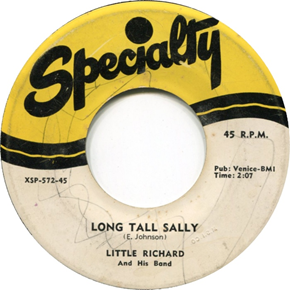
"Long Tall Sally", also known as "Long Tall Sally (The Thing)", is a rock and roll song written by Robert "Bumps" Blackwell, Enotris Johnson, and Little Richard. Richard recorded it for Specialty Records, which released it as a single in March 1956, backed with "Slippin' and Slidin'".
"Gonna Get Along Without Ya Now" is a popular song written by bandleader and occasional songwriter Milton Kellem The first known recorded version was released in 1951 by Roy Hogsed. Since then it has been done in several styles and tempos.
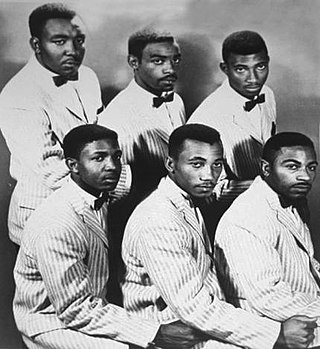
Maurice Williams and the Zodiacs were an American doo-wop/R&B vocal group in the late 1950s and early 1960s. Originally the (Royal) Charms, the band changed its name to the Gladiolas in 1957 and the Excellos in 1958, before finally settling on the Zodiacs in 1959.

"I Can't Dance" is the fourth track from English rock band Genesis's fourteenth studio album, We Can't Dance (1991), and was released in December 1991 as the second single from the album. Lyrics were composed by drummer Phil Collins; music was written collectively by the band. The song peaked at number seven on both the US Billboard Hot 100 and the UK Singles Chart, and also received a Grammy Award nomination for Best Pop Performance by a Duo or Group With Vocals in 1993. In Europe, the song reached number one in Belgium and the Netherlands, while peaking within the top five in Austria, Germany, and Portugal.
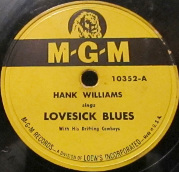
"Lovesick Blues" is a Tin Pan Alley song, composed by Cliff Friend, with lyrics by Irving Mills. It first appeared in the 1922 musical "Oh, Ernest", and was recorded that year by Elsie Clark and Jack Shea. Emmett Miller recorded it in 1925 and 1928, followed by country music singer Rex Griffin in 1939. The recordings by Griffin and Miller inspired Hank Williams to perform the song during his first appearances on the Louisiana Hayride radio show in 1948. Receiving an enthusiastic reception from the audience, Williams decided to record his own version despite initial push back from his producer Fred Rose and his band.

“Creeque Alley” is an autobiographical hit single written by John Phillips and Michelle Phillips of the Mamas and the Papas in late 1966, narrating the story of how the group was formed, and its early years. The third song on the album Deliver, it peaked at #5 on the U.S. Billboard pop singles chart the week of Memorial Day 1967, becoming their last Top 10 hit. It made #9 on the UK Singles Chart, and #4 on the Australian and #1 on the Canadian charts.

"Can't Get Used to Losing You" is a song written by Jerome "Doc" Pomus and Mort Shuman, first made popular by Andy Williams in a 1963 record release, which was a number-two hit in both the US and the UK. Twenty years later, British band the Beat took a reggae re-arrangement to number three in the UK.
"Faded Love" is a Western swing song written by Bob Wills, his father John Wills, and his brother, Billy Jack Wills. The tune is considered to be an exemplar of the Western swing fiddle component of American fiddle.

"I Do (Cherish You)" is a song written by Keith Stegall and Dan Hill. It was first released in February 1998 by American country music artist Mark Wills. The first single from his second album, Wish You Were Here, it became his third top-10 hit on the US Billboard Hot Country Singles & Tracks chart that year.

"A White Sport Coat (And A Pink Carnation)" is a 1957 country and western song with words and music both written by Marty Robbins. It was recorded on January 25, 1957, and released on the Columbia Records label, over a month later, on March 4. The arranger and recording session conductor was Ray Conniff, an in-house conductor/arranger at Columbia. Robbins had demanded to have Conniff oversee the recording after his earlier hit, "Singing the Blues", had been quickly eclipsed on the charts by Guy Mitchell's cover version, which was scored and conducted by Conniff in October 1956.
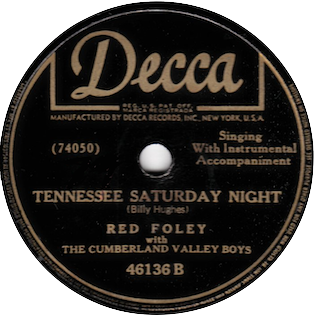
"Tennessee Saturday Night" is a Western swing ballad written by Billy Hughes.
"Roly Poly" is a humorous Western swing standard written by Fred Rose in 1946. In the song, Roly Poly is a very active boy who eats continuously to keep his strength up. Each verse ends with:
"New Spanish Two Step" is a Western swing standard based on a traditional fiddle tune, "Spanish Two Step". Bob Wills and His Texas Playboys recorded the latter on September 23, 1935, and released it on Vocalion 03230 in 1936. Ten years later, Wills and Tommy Duncan added lyrics and recorded it again on April 25, 1945, releasing it on Columbia 36966 in April 1946 as "New Spanish Two Step". It stayed on the charts for 23 weeks, reaching number one on the Folk-Jukebox chart for 16 weeks. Both versions were one of the band's signature songs.

"Right or Wrong" is a jazz ballad from 1921. Composed by Arthur Sizemore and Paul Biese, with words by Haven Gillespie, it is described by the original sheet music as "a beautiful fox-trot ballad."
"Ida Red" is an American traditional song of unknown origin, made famous in the upbeat 1938 version by Bob Wills and his Texas Playboys, the primary inspiration for Chuck Berry's first big hit "Maybellene". It is chiefly identified by variations of the chorus:
"Straighten Up and Fly Right" is a 1943 song written by Nat King Cole and Irving Mills and one of the first vocal hits for the King Cole Trio. It was the trio's most popular single, reaching number one on the Harlem Hit Parade for ten nonconsecutive weeks. The single also peaked at number nine on the pop charts. "Straighten Up and Fly Right" also reached number one for six nonconsecutive weeks on the Most Played Jukebox Hillbilly Records.
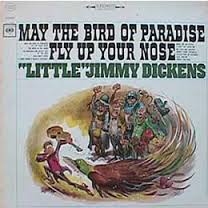
"May the Bird of Paradise Fly up Your Nose" is a 1965 novelty song performed by Little Jimmy Dickens. It was Dickens' most successful single on the U.S. country music chart. It spent two weeks at No. 1 that November, and stayed on the chart for a total of 18 weeks. On the overall Billboard Hot 100 the song peaked at No. 15. It was his only Top 40 hit on the latter chart.

"I Can't Stay Mad at You" is a song written by Gerry Goffin and Carole King. It was originally recorded by American country artist Skeeter Davis, becoming her second top-ten hit on the Billboard Hot 100 in 1963. "I Can't Stay Mad at You" followed on the popular success of Davis' earlier 1963 crossover hit "The End of the World". The song was one of the first Goffin-King compositions to be recorded by a country music performer.
References
- ↑ Cohen, Folk Music, p. 209-210: "A version of 'Shinbone Alley' was published in 1833, though its origins may be still older:
"Old Miss Tuck and my aunt Sallie
Both lived down in shinbone alley.
No sign on the gate, no number on the door;
Folks around here are gittin might poor." - ↑ Whitburn, The Billboard Book of Top 40 Country Hits, p. 493